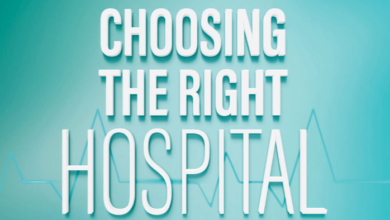The Benefits of Professional Hospital Services

Introduction
When it comes to healthcare, the quality of service you receive can significantly impact your overall well-being. Professional hospital services, delivered by highly trained medical staff within well-equipped facilities, provide a comprehensive and effective approach to patient care. From specialized treatment options to state-of-the-art technology, professional hospital services ensure that patients receive the highest level of care possible. In this article, we’ll delve into the many benefits of these services, highlighting how they contribute to improved patient outcomes, enhanced safety, and a better healthcare experience.
Access to Specialized Medical Expertise
One of the primary benefits of professional hospital services is access to specialized medical expertise. Hospitals employ a wide range of healthcare professionals, including doctors, nurses, and specialists who have extensive training and experience in their respective fields. Whether you need cardiology, oncology, orthopedics, or any other specialized care, professional hospitals have the expertise to diagnose and treat complex conditions effectively.
This access to specialized care ensures that patients receive accurate diagnoses and tailored treatment plans. For instance, if you have a heart condition, a cardiologist within a professional hospital can provide the most up-to-date treatments and interventions. The collaboration among specialists within the hospital further enhances the quality of care, as different experts can work together to address multiple aspects of a patient’s health.
Advanced Diagnostic and Treatment Technology
Professional hospital services are supported by advanced diagnostic and treatment technology, which plays a crucial role in patient care. Modern hospitals are equipped with cutting-edge medical equipment such as MRI machines, CT scanners, and robotic surgical systems, which enable precise diagnosis and minimally invasive treatments. This technology not only improves the accuracy of medical procedures but also reduces recovery times and the risk of complications.
For example, robotic surgery allows surgeons to perform complex procedures with greater precision and control, resulting in smaller incisions, less pain, and faster recovery for patients. Advanced imaging technologies provide detailed insights into the body, allowing for early detection of diseases and more effective treatment planning. The availability of such technology in professional hospitals ensures that patients receive the most effective care based on the latest medical advancements.
Comprehensive Care and Continuity
Another significant benefit of professional hospital services is the comprehensive care and continuity they provide. Hospitals are equipped to handle a wide range of medical needs, from emergency care and surgery to rehabilitation and long-term treatment. This means that patients can receive all necessary care within one facility, reducing the need for multiple visits to different healthcare providers.
The continuity of care offered by hospitals ensures that patients have consistent access to medical professionals who are familiar with their medical history and ongoing needs. For instance, after surgery, a patient can receive follow-up care, physical therapy, and any additional treatments all within the same hospital. This seamless transition from one stage of care to another enhances patient outcomes and ensures that no aspect of their health is overlooked.
Enhanced Patient Safety
Patient safety is a top priority in professional hospital services. Hospitals follow strict protocols and guidelines to ensure that patients are treated in a safe and controlled environment. This includes everything from infection control measures and medication management to emergency preparedness and patient monitoring.
Professional hospitals are staffed by highly trained medical professionals who are adept at recognizing and responding to potential safety concerns. For example, hospitals have specialized teams and equipment to handle medical emergencies, such as cardiac arrest or severe allergic reactions, ensuring that patients receive immediate and effective care. The rigorous standards of care maintained by professional hospitals contribute to reduced risks of complications, infections, and other adverse events.
24/7 Availability of Care
One of the most significant advantages of professional hospital services is the availability of care around the clock. Unlike outpatient clinics or private practices, hospitals are open 24/7, providing immediate care for medical emergencies at any time of day or night. This availability is crucial for conditions that require urgent attention, such as heart attacks, strokes, or traumatic injuries.
Having access to 24/7 care ensures that patients can receive timely treatment, which can be life-saving in critical situations. Additionally, hospitals often have on-call specialists who can be summoned quickly for emergencies, ensuring that patients receive the specialized care they need without delay. This constant availability of care is a key component of the comprehensive and responsive service that professional hospitals offer.
Multidisciplinary Approach to Treatment
Professional hospital services often involve a multidisciplinary approach to treatment, which is one of the hallmarks of high-quality healthcare. This approach involves collaboration between various healthcare professionals, including doctors, nurses, physical therapists, dietitians, and social workers, all working together to address different aspects of a patient’s health.
For example, a patient recovering from a stroke may require the expertise of a neurologist, a physical therapist, a speech therapist, and a dietitian to address the full scope of their needs. By coordinating care among these specialists, hospitals can create a comprehensive treatment plan that addresses the patient’s physical, emotional, and social well-being. This holistic approach not only improves patient outcomes but also enhances the overall healthcare experience.
Tailored Care Plans and Personalized Treatment
One of the standout benefits of professional hospital services is the ability to create tailored care plans and personalized treatment for each patient. Hospitals recognize that every patient is unique, with individual medical histories, conditions, and needs. As a result, they focus on developing customized care plans that consider all aspects of a patient’s health.
Personalized treatment plans ensure that patients receive the most appropriate and effective care for their specific condition. For instance, cancer treatment plans are often tailored to the type of cancer, its stage, and the patient’s overall health. This personalized approach extends to other areas of care as well, such as pain management, rehabilitation, and chronic disease management. The result is a more targeted and effective treatment that improves patient outcomes and satisfaction.
Rehabilitation and Post-Acute Care Services
Rehabilitation and post-acute care services are essential components of professional hospital services. After a significant medical event such as surgery, injury, or a serious illness, patients often require ongoing care and rehabilitation to regain their strength and functionality. Hospitals provide these services through specialized rehabilitation programs that focus on physical, occupational, and speech therapy.
Rehabilitation services help patients recover more quickly and completely, reducing the risk of long-term disability. For example, after a hip replacement surgery, a patient may need physical therapy to regain mobility and strength. Hospitals also offer post-acute care services, including skilled nursing care, to support patients during their recovery. These services ensure that patients continue to receive high-quality care even after they leave the hospital, facilitating a smoother transition back to their daily lives.
Patient Education and Support
Education and support are integral parts of professional hospital services. Hospitals recognize the importance of empowering patients with knowledge about their health conditions, treatments, and recovery processes. This education helps patients make informed decisions about their care and better manage their health.
Hospitals often provide educational resources, including classes, brochures, and one-on-one counseling, to help patients understand their conditions and treatment options. For example, a patient with diabetes might receive education on how to manage their blood sugar levels, make dietary changes, and recognize the signs of complications. Additionally, hospitals offer support services such as counseling, support groups, and social work services to address the emotional and psychological aspects of illness and recovery.
Efficient and Coordinated Care
Professional hospital services emphasize efficiency and coordination in patient care. Hospitals are designed to provide streamlined care, ensuring that patients receive timely and appropriate treatment without unnecessary delays. This efficiency is achieved through well-established protocols, advanced medical technology, and effective communication among healthcare teams.
For example, in the case of a heart attack, hospitals have protocols in place to quickly diagnose the condition, administer life-saving treatments, and coordinate care with cardiologists and other specialists. This level of coordination ensures that patients receive the right care at the right time, improving their chances of a positive outcome. Efficient and coordinated care is especially important in emergency situations, where every minute counts.
Support for Chronic Disease Management
Chronic diseases such as diabetes, hypertension, and heart disease require ongoing management to prevent complications and improve quality of life. Professional hospital services offer comprehensive support for managing chronic conditions, including regular monitoring, medication management, and lifestyle counseling.
Hospitals provide access to specialists who can help patients manage their chronic conditions more effectively. For example, an endocrinologist can work with a patient with diabetes to develop a personalized treatment plan that includes medication, diet, and exercise. Hospitals also offer chronic disease management programs that provide continuous support and education to help patients stay on track with their treatment plans. This ongoing support is crucial for preventing complications and improving long-term health outcomes.
Quality Assurance and Continuous Improvement
Professional hospital services are committed to quality assurance and continuous improvement. Hospitals regularly evaluate their practices and outcomes to ensure that they are providing the highest level of care possible. This commitment to quality is reflected in accreditation from recognized organizations, adherence to evidence-based guidelines, and participation in quality improvement initiatives.
Continuous improvement efforts in hospitals focus on enhancing patient safety, reducing errors, and improving patient satisfaction. For example, hospitals may implement new protocols to reduce the risk of hospital-acquired infections or adopt advanced technology to improve diagnostic accuracy. By continuously striving to improve, professional hospitals ensure that patients receive the best possible care at all times.
Emotional and Psychological Support
The emotional and psychological aspects of healthcare are just as important as the physical ones, and professional hospital services recognize this. Hospitals provide a range of emotional and psychological support services to help patients and their families cope with the challenges of illness, treatment, and recovery.
For instance, hospitals often have social workers, counselors, and chaplains available to provide support during difficult times. These professionals can offer counseling, connect patients with support groups, and provide resources for dealing with stress, anxiety, and depression. Emotional and psychological support is especially important for patients facing serious or life-threatening conditions, as it helps them and their families navigate the complexities of treatment and recovery.





